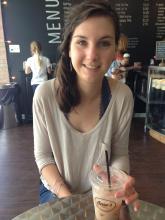In the Aging and Cognitive Training Lab, I began my first semester of exploration in cognitive psychology by working with a graduate student examining the effects of saccadic bilateral eye movements on memory during my sophomore year. We conducted a study in order to test whether participants could accurately identify previously studied intact and rearranged word pairs before moving their eyes bilaterally. We then centralized a research project around the idea that pictures create a more fluent feeling when information is being encoded and stored, however pictures can also bias subjective perceptions of truthfulness in claims. During my second and third semesters working in the ACT Lab, I became heavily involved in a masters student’s thesis investigating enhancement of attentional processes and far transfer of gaming abilities after contextual variability in video game training. I administered five different cognitive tasks (Operation Span, Functional Field of View, Anti-Saccade, Attentional Blink, and Letter Comparison) to participants prior to and after 13 hours of controlled, in-lab video game training. I began my fourth semester conducting research by designing a project examining judgment-making processes. Specifically, I have studied the literature in order to design an experiment which captures the process of attribute substitution using judgments of overall physical attractiveness (heuristic attribute) and participant’s likeability of the dresses (target attribute) worn by the models presented. I am still currently working on this project. In addition to that, we are currently running a study exploring the activation of default mode network (DMN). The default mode network is a brain network located in the rostromedial prefrontal cortex amongst other areas that activates when we are internally attended, such as mindwandering. We have programed sequences of tasks in order to use functional near infared spectroscopy to view a zipper pattern of activation and deactivation of DMN. In this project, we are aiming to view different levels of activation of the DMN with the varying internal tasks we are using. We won a SURCA grant to fund travel expenses to present this research the APS convention in Chicago this upcoming May.
In the Interdisciplinary Data Excellency & Analytics Lab, I have enjoyed this past semester engineering software using R to examine analysis of variance statistics evaluating the relationships between trauma symptom inventory answers in post-traumatic stress disorder and/or traumatic brain injury patients in the military. We are planning on presenting our findings for this project at the CSURF showcase this spring.
I always knew I wanted to be a psychology major, but I never really knew how I wanted to implement these interests until I came to college and realized my professors spent most of their time in labs on the third floor of the TL building. I immediately knew I wanted to be a part of the research being conducted here. After interviewing for two labs I was offered a position in both, but I chose to be a part of the Aging & Cognitive Training lab. Looking back, my decision could not have been a better one. I have gained undescribable amounts of knowledge, experience, and information to take with me as I pursue a future career as a principle investigator.
I gained more than I could ever really put into words. In addition to the hands-on experience of learning how to structure research questions, design a respective method, carry out data collection, calculate statistics, interpret results, write formal manuscripts, and present research, I have learned that this is where I belong. Despite some major ups and downs and a lot of mistakes along the way, I gained a unique way of looking at who I am and realized that I have every ability to take what I've learned and run with it, and that is exactly what I'm going to do.
Like I've said before, this experience so shaped who I sought out to be. It has given me a wealth of undergraduate research experience well-suited for a position in a lab as a graduate student. My wide variety of research concerning many different cognitive processes and being involved in research in different departments has significantly prepared me for the rigor of graduate study. I'm so excited to confirm that this upcoming August, I will indeed be a graduate student. I have not decided where I'm going to go yet, but my experiences have led me to being admitted into a competitive graduate program, so I'm beyond thankful for everything I have learned here at UNCW.





